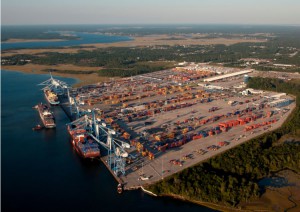By Kyra Morris, contributing editor | My husband and I traveled all over Australia last month. At the beginning of June, only a few people we met were familiar with Charleston, our fair city. By the end of our travels because of the tragedy at Mother Emanuel, most of the people we met knew of Charleston.
 Their comments were kind expressions of sorrow, but also of how they were impressed by the total community support and display of love and unity that Charleston showed to the families of the victims. This unity was felt by the world.
Their comments were kind expressions of sorrow, but also of how they were impressed by the total community support and display of love and unity that Charleston showed to the families of the victims. This unity was felt by the world.
We did that part right. We let the world know that Charleston is not a place of hate. Charleston responded as a whole community with a cornucopia of resources to aid the grieving families. There was a complete integration that was apparent, embracing those that were harmed and denouncing the hate-filled act. This was what the rest of the world saw of Charleston.
Although I enjoy the thought of Charleston becoming a global community, this is not the pathway I envisioned to achieve this goal. There are so many other things I want to write about to show the progress we’ve made in our global presence. We are a tourist mecca. We have international businesses. We have a productive port, and we have our own World Trade Center.
Charleston is in well ensconced as one of the top 10 most desirable cities in the world for tourists to visit. We have a diversity of attractions. The cultural preservation of our history and the architecture welcomes many every year. Our culinary offerings compete with New York and San Francisco, and we have a world-class community of artists and artisans in a variety of fields. The artists and culinary features promote unique shopping experiences.
Boeing is our biggest claim for international business, and there are many others. These businesses bring quality new people to our community. Often, these people are the best and brightest from all over the world. These businesses also attract support businesses that represent different parts of the world.
 Since its founding in 1670, Charleston’s port has been a part of Charleston’s culture. Our deepwater port can manage the large new post-Panamax vessels fully loaded. The five terminals are close to the open sea which makes it very competitive. The port is receiving a lot of accolades for its customer satisfaction and for being a world-class productive container port. The Port of Charleston’s website states this and I have to agree, “[Our] port is a powerful magnet for manufacturing and distribution companies all over the world.”
Since its founding in 1670, Charleston’s port has been a part of Charleston’s culture. Our deepwater port can manage the large new post-Panamax vessels fully loaded. The five terminals are close to the open sea which makes it very competitive. The port is receiving a lot of accolades for its customer satisfaction and for being a world-class productive container port. The Port of Charleston’s website states this and I have to agree, “[Our] port is a powerful magnet for manufacturing and distribution companies all over the world.”
Charleston also has its own World Trade Center, a member of the World Trade Centers Association. This is an initiative of the Charleston Metro Chamber of Commerce. Our World Trade Center provides advocacy, programs and services in support of international trade. It is part of an extensive network of world trade centers throughout the globe and provides the ability to connect businesses in the Charleston region to more than 750,000 potential customers who are members of more than 320 world trade centers in 96 countries.
My whole article was going to be about Charleston as a global city. I wanted to talk specifically about the World Trade Center and why this initiative is important to our community. Then tragedy struck. Charleston was in the world’s eye. We did and are working through this grief, and we are applying the healing touches needed in our community. I am very proud to be a Charlestonian. The picture of love and unity in a Southern U.S. city is not a façade. It is deep in our spirit. This light shines out into the world. This makes us truly a global community!



 We Can Do Better, South Carolina!
We Can Do Better, South Carolina!
























